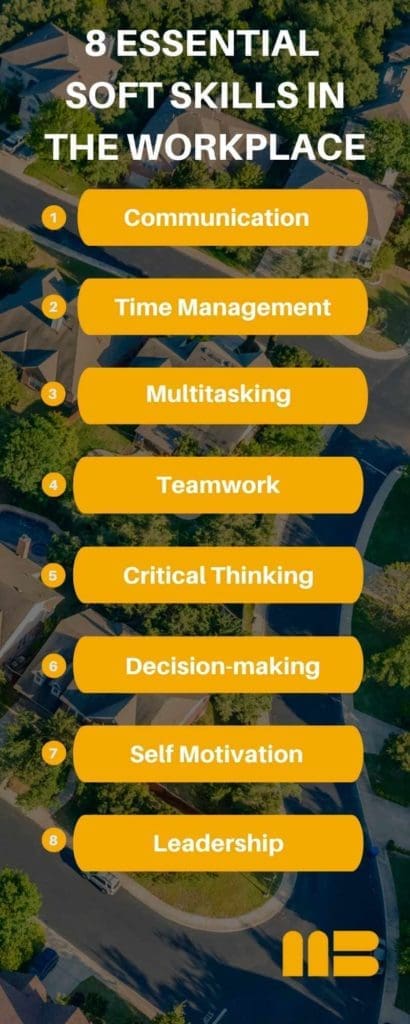Leveraging and improving essential soft skills in the workplace is important for new employees, seasoned managers, and job candidates embarking on a career search. Soft skills in the workplace that employers are seeking the most are essential requirements for working, learning, and leading at your best. Sometimes referred to as people skills, examples of key soft skills include being a team player, having a positive attitude, having great social skills, and having a strong work ethic.
What are soft skills in the workplace?
Soft skills are personality habits and traits you may have spent your whole life developing. They are called upon when you manage your time, communicate with others, make decisions, and confront a difficult situation for the first time.
At MatchBuilt, we’ve counseled 1000s of job seekers and 100s of clients throughout the hiring process. This post will explore the critical soft skills and skill sets employers seek in today’s workplace. Understanding the most important skills will help you communicate them to a hiring manager and showcase how well you’ll do in leadership roles and challenging situations.
What are the most important soft skills in today’s workplace?
- Communication
- Time management
- Multitasking
- Teamwork
- Critical thinking
- Decision making
- Self-motivation
- Leadership
Follow along to learn why good leaders, great salespeople, and top customer service advocates often embody hard and soft skills in the workplace. Learn why employers prefer that potential employees are active listeners with high emotional intelligence and have excellent public speaking, problem-solving, and strong communication skills.
8 Important Soft Skills in the Workplace
Soft skills in the workplace are sometimes hard to articulate. They’re typically positive personality traits and personal behaviors that show up in everyday life, but they may be challenging to communicate during job interviews or on resumes. Below are examples of soft skills that are important in any work environment.
1. Communication
Effective communication and on-point interpersonal skills are essential in operations management, conflict resolution, and other work requirements. You need to understand the requests of each party fully. After that, you’ll have to convey them accurately to a different recipient without distortion. Good communicators also tell stories to engage, motivate, or negotiate with others. Effective communication with clients is equally important as amongst coworkers.
Caitlin Sisley, with Workflow Max, suggests the following tips for client communication, all of which apply on-site and in the office:
- Establish credibility immediately
- Avoid industry jargon and buzzwords
- Choose one point of contact
- Practice active listening
- Define the rules of engagement
- Use visual technology
- Be transparent
2. Time Management
Some people give the impression that they’re always busy, but their productivity isn’t high. They work hard but don’t extend their effort where it matters. Effective time management enables an individual to complete more in a shorter time, lowers stress, and leads to career success.
Joan Mooney, with Builder Magazine, suggests the following time management tips for homebuilders.
- Plan upfront in as much detail as you can
- Educate your subcontractors
- Streamline your communication with a weekly email
- Delegate
- Don’t neglect less immediate tasks
- Create a focus for your company and your teams
- Set your priorities
- Mind your attention
3. Multitasking
You are greeted with hundreds of emails, appointments, and paperwork every morning. There might be a crisis waiting for your intervention, as well. Wouldn’t it be nice if we could make ten clones of ourselves? On the job site and in the office, we have to multitask under pressure and even take the initiative numerous times a week and month while keeping an upbeat disposition.
Cleverism notes that “multitasking” comes from “computer multitasking,” the ability to perform several tasks simultaneously.
Human multitasking is a human’s ability to perform multiple tasks simultaneously. We often multitask without even realizing it, watching TV while checking texts, listening to music while working, or walking while talking to someone. Done correctly, effective multitasking is an exercise in brain behavior and the ensuing organization and utilization of the neural channels within.
Cleverism suggests these important techniques to help you multitask more effectively.
- Make a to-do list
- Prioritize
- Solve tasks in blocks
- Avoid distractions
- Delegate
- Practice
4. Teamwork
Working with teams is critical for the success of any large project or company goal. In multidisciplinary homebuilding operations, for example, harmony is essential for getting any work done. Difficult people are usually replaced promptly, and a good team player often gets quick promotions.
In a good read by building industry veteran Charlie Scott at Professional Builder Magazine about the “High Cost of Hero Syndrom,” he suggests the following secrets to building teamwork.
- Pick team players. Look for new hires who have demonstrated their version of teamwork: sports, band, choir, church, community work, or volunteer work.
- Craft some plans. With team members in place, management should define an operational and customer-experience strategy.
- Measure performance. Identify the Key Performance Indicators for every member of your team.
- Monitor performance. Measuring alone doesn’t cut it. Frequent monitoring is critical for teamwork and success.
- Huddle up. From beach volleyball to football to homebuilders, competent teams huddle up before they play. When you do, listen to staff and communicate with them daily.
- Listen to the voice of the customer. VOC is one of the critical metrics to monitor.
- If you need to, call an audible. Team productivity excels when a leader or coach can recognize patterns and make intelligent plan changes on the fly.
5. Critical Thinking
Regardless of your place within a company, you’ll encounter a situation where you’ll examine the work done against a set standard and have to modify procedures for better or more efficient outcomes. This is an example of critical thinking, a vital soft skill for an organization’s success.
Business.com suggests following this six-step problem-solving process to foster critical thinking in your team.
- Name the situation. When you name the situation, you present a single discussion point that everyone in the discussion can identify.
- List all possible solutions. Brainstorming occurs during this part of the process, and there is nothing outside the realm of possibilities at this point in the discussion.
- Narrow your solutions into three options. Everyone on the team must agree with at least one of the three options. Individuals who can find a compromise and create solutions from many perspectives are better able to bring a team together.
- Choose one option from the three choices. Make a final choice that offers the best chance of success based on a rational discussion about the situation.
- Put a plan in place to implement the chosen solution. Your chosen solution should have timelines and a list that identifies which participants are responsible for what parts of the final plan.
- Complete the plan. Think of the number of times a great project floundered because there was no follow-up. Make sure each team member has a part to play in the process that emphasizes their areas of expertise and interest.
6. Decision Making
Every project or work challenge has numerous decisions and tasks, and every dedicated team member has to decide about various issues to move a project forward.
Bruce Harpham, the founder of ProjectManagementHacks.com, writes:
How often do you think about—and work on—your decision-making skills as you focus on juggling your project schedule, managing resources and other job demands?
Improving your ability to make decisions is simple.
Psychologists, economists, philosophers, and other scholars have been studying how people made decisions for ages.
The good news is that improving your ability to make a smart decision is mainly a matter of avoiding mistakes.
Bruce suggests the following tips for making better decisions:
- The two-minute rule. Can you complete the action in less than two minutes? Do it right now and stop thinking about it any further.
- Make minor decisions fast. For small decisions, spend a small amount of time.
- Pick up the phone. Email can slow down decision-making. Make a short phone call the next time you need more information to decide.
- Establish criteria for significant decisions. When allocating resources, assigning major project tasks, and spending large amounts of money, it’s important to be thoughtful.
- Avoid big decisions before lunch.
- The halo effect. The halo effect is a cognitive bias where we develop opinions of people based on overall (and popular) impressions. Take the time to realize that everyone has strengths and weaknesses on your project—first impressions can lead you astray.
- Availability bias. It would be best if you relied on your project team to combat the availability bias. By regularly asking, “What else can we do about the situation?” or “What other options are there?” you’ll go a long way to fighting this bias.
- Escape the curse of knowledge—act like a beginner. Have you ever yelled at a project stakeholder because they didn’t understand technology? If so, you’ve fallen victim to the curse of knowledge. Your communication with stakeholders will suffer until you free yourself from this curse.
- Endowment effect: loss hurts. Before you cut a feature or function from the project, ask yourself, “Are there any stakeholders who directly asked for this?” If so, talk to that stakeholder before making a final decision. They may have helpful ideas or resources that enable you to keep the project scope intact.
- Fundamental attribution error. Relying on personality-based explanations for behavior is the heart of the fundamental attribution error.
7. Self Motivation
Self-motivation is powerful and drives us to keep forging ahead. In the home building industry, amongst others, self-motivation drives us to learn and succeed, no matter the scenario continuously. It is a primary means of realizing our goals and progressing. This drive for success and improvement is the basis for creating a strong culture at most companies.
The Army Cadets have a few great tips about improving self-motivation in the workplace:
- Set a goal and think of it regularly: Having a concrete goal is the best way to keep yourself motivated. Your goal might be getting a promotion or a pay rise, working on a desirable project, learning a new skill, or even finding a new job.
- Only do meaningful work: This is easier said than done, but doing only meaningful work makes motivation effortless. If you care deeply about the things you are working on, you are better equipped to deal with the inevitable stresses and difficulties you’ll face.
- Develop a good work/life balance: Again, often easier said than done, but this is an important one to strive for, especially if you have a demanding job.
- Get to know your colleagues: Even if you work in a large company, take the time to get to know your colleagues. When you value and care about the people you’re working with, motivating yourself to work hard makes it much more manageable.
- Celebrate the small successes: We often dwell on our mistakes or failures but forget to dwell on our successes. Focusing on the things you’ve done well will boost your positivity.
8. Leadership
Leadership is a unique soft skill that provides limitless benefits to all companies. Being a leader means having an extensive set of soft skills, including many mentioned above. Also, empathy, thoroughness, creativity, vision, and risk-taking ability encompass a strong leader and are very important in the office and on-site.
Personal development guru, Tony Robbins, suggests the following ways of developing leadership skills.
- Be passionate
- Model great leadership for others
- Set concrete goals and execute them
- Admit when you fail and move on
- Motivate others
- Find your higher purpose
Soft Skills at Work Infographic
Essential Soft Skills in the Workplace Summary
Workplace soft skills employers seek the most are essential for working, learning, and leading at your best. Sometimes referred to as people skills, examples of key soft skills include being a team player, having a positive attitude, having great social skills, and having a strong work ethic.
Leading recruiters and human resource managers look for the best candidates to fill managerial, administrative, or technical jobs, and soft skills have recently become a significant differentiator. The most important soft skills in today’s workplace include communication, time management, multitasking, teamwork, critical thinking, decision-making, self-motivation, and leadership.
That’s why showcasing your soft skills for the work well in your resume and during interviews is essential. Show-not-tell applies perfectly to a resume, so explore the projects and tasks that reflect your best qualities, but don’t exaggerate; be candid and proud. Furthermore, these skills will benefit you more when preparing for common behavioral interview questions.




